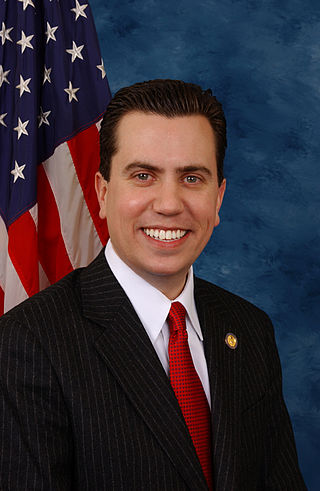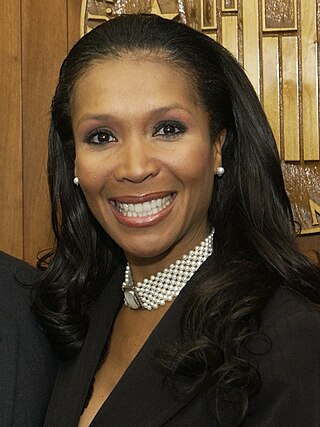Related Research Articles
Campaign finance laws in the United States have been a contentious political issue since the early days of the union. The most recent major federal law affecting campaign finance was the Bipartisan Campaign Reform Act (BCRA) of 2002, also known as "McCain-Feingold". Key provisions of the law prohibited unregulated contributions to national political parties and limited the use of corporate and union money to fund ads discussing political issues within 60 days of a general election or 30 days of a primary election; However, provisions of BCRA limiting corporate and union expenditures for issue advertising were overturned by the Supreme Court in Federal Election Commission v. Wisconsin Right to Life.
Corporate personhood or juridical personality is the legal notion that a juridical person such as a corporation, separately from its associated human beings, has at least some of the legal rights and responsibilities enjoyed by natural persons. In most countries, a corporation has the same rights as a natural person to hold property, enter into contracts, and to sue or be sued.
In the United States, a political action committee (PAC) is a 527 organization that pools campaign contributions from members and donates those funds to campaigns for or against candidates, ballot initiatives, or legislation. The legal term PAC was created in pursuit of campaign finance reform in the United States. Democracies of other countries use different terms for the units of campaign spending or spending on political competition. At the U.S. federal level, an organization becomes a PAC when it receives or spends more than $1,000 for the purpose of influencing a federal election, and registers with the Federal Election Commission (FEC), according to the Federal Election Campaign Act as amended by the Bipartisan Campaign Reform Act of 2002. At the state level, an organization becomes a PAC according to the state's election laws.

The Bipartisan Campaign Reform Act of 2002, commonly known as the McCain–Feingold Act or BCRA, is a United States federal law that amended the Federal Election Campaign Act of 1971, which regulates the financing of political campaigns. Its chief sponsors were senators Russ Feingold (D-WI) and John McCain (R-AZ). The law became effective on 6 November 2002, and the new legal limits became effective on January 1, 2003.
McConnell v. Federal Election Commission, 540 U.S. 93 (2003), is a case in which the United States Supreme Court upheld the constitutionality of most of the Bipartisan Campaign Reform Act (BCRA), often referred to as the McCain–Feingold Act.
First National Bank of Boston v. Bellotti, 435 U.S. 765 (1978), is a U.S. constitutional law case which defined the free speech right of corporations for the first time. The United States Supreme Court held that corporations have a First Amendment right to make contributions to ballot initiative campaigns. The ruling came in response to a Massachusetts law that prohibited corporate donations in ballot initiatives unless the corporation's interests were directly involved.

David Daniel Boren is the Secretary of Commerce for the Chickasaw Nation, based in Oklahoma. He is a retired American politician, who served as the U.S. representative for Oklahoma's 2nd congressional district from 2005 to 2013. The district included most of the eastern part of the state outside of Tulsa. He is a member of the Democratic Party. He also served as a State Representative in the 28th district of the Oklahoma House of Representatives.

The United States Chamber of Commerce (USCC) is the largest lobbying group in the United States, representing over three million businesses and organizations. The group was founded in April 1912 out of local chambers of commerce at the urging of President William Howard Taft and his Secretary of Commerce and Labor Charles Nagel. It was Taft's belief that the "government needed to deal with a group that could speak with authority for the interests of business".

The financing of electoral campaigns in the United States happens at the federal, state, and local levels by contributions from individuals, corporations, political action committees, and sometimes the government. Campaign spending has risen steadily at least since 1990.

Angela McGlowan is an American Republican political commentator, best-selling author, and CEO of Political Strategies & Insights (PSI), a government affairs, political strategy, public relations, and advocacy consulting firm based in Oxford, Mississippi, and Washington, D.C. She is a contributor on Fox News, covering politics, special interest groups, and lobbies.
Federal Election Commission v. Wisconsin Right to Life, Inc., 551 U.S. 449 (2007), is a United States Supreme Court case in which the Court held that issue ads may not be banned from the months preceding a primary or general election.
Austin v. Michigan Chamber of Commerce, 494 U.S. 652 (1990), is a United States corporate law case of the Supreme Court of the United States holding that the Michigan Campaign Finance Act, which prohibited corporations from using treasury money to make independent expenditures to support or oppose candidates in elections, did not violate the First and Fourteenth Amendments. The Court upheld the restriction on corporate speech, stating, "Corporate wealth can unfairly influence elections"; however, the Michigan law still allowed the corporation to make such expenditures from a segregated fund.

The Tillman Act of 1907 was the first campaign finance law in the United States. The Act prohibited monetary contributions to federal candidates by corporations and nationally chartered (interstate) banks.

Suzan Kay DelBene is an American politician and businesswoman who has been the United States representative from Washington's 1st congressional district since 2012.
Citizens United v. Federal Election Commission, 558 U.S. 310 (2010), was a landmark decision of the Supreme Court of the United States regarding campaign finance laws and free speech under the First Amendment to the U.S. Constitution. It was argued in 2009 and decided in 2010. The court held 5-4 that the free speech clause of the First Amendment prohibits the government from restricting independent expenditures for political campaigns by corporations, including nonprofit corporations, labor unions, and other associations.

Move to Amend is a national, non-partisan, grassroots organization that seeks to blunt corporate power by amending the United States Constitution to end corporate personhood and state that money is not speech. The group was created in response to the 2010 Supreme Court ruling Citizens United v. Federal Election Commission, which held that corporations have a First Amendment right to make expenditures from their general treasuries supporting or opposing candidates for political office, arguing that the Court's decision disrupts the democratic process by granting disproportionate influence to the wealthy. Move to Amend advocates for the "We the People" Amendment, currently in Congress as H.J.Res. 48, to establish that constitutional rights are reserved for natural persons only and require the regulation and disclosure of spending in U.S. elections.
American Tradition Partnership, Inc. v. Bullock, 2011 MT 328, is a decision by the Montana Supreme Court ruling that the broad free speech protections given to corporations in Citizens United v. FEC do not apply to Montana's campaign finance laws. The United States Supreme Court reversed the Montana Supreme Court's decision in American Tradition Partnership, Inc. v. Bullock, 567, U.S. 516 (2012), in a short, per curiam opinion issued without oral argument. The court wrote only that the legal issue had already been precluded by Citizens United, and this case offered no new arguments and failed to distinguish that prior decision.
A campaign finance reform amendment refers to any proposed amendment to the United States Constitution to authorize greater restrictions on spending related to political speech, and to overturn Supreme Court rulings which have narrowed such laws under the First Amendment. Several amendments have been filed since Citizens United v. Federal Election Commission and the Occupy movement.

Katherine Moore Porter is an American politician, law professor, and lawyer who is the U.S. representative from California's 47th congressional district since 2023, previously representing the 45th congressional district from 2019 to 2023. She is the first Democrat to be elected to represent the 45th district, covering much of south-central Orange County, including Irvine, Tustin, and Lake Forest along with large portions of Anaheim and Laguna Niguel. Porter was reelected in 2022 in the newly redistricted 47th congressional district. She is a candidate for United States Senate in 2024, seeking the seat currently held by Dianne Feinstein.

The 2022 Minnesota's 1st congressional district special election was a special election held on August 9, 2022. The seat became vacant when incumbent Republican representative Jim Hagedorn died on February 17, 2022, from kidney cancer.
References
- ↑ Klein, William (March 28, 2010). "Supreme Court Ruling Spurs Corporation To Run for Congress:First Test of "Corporate Personhood" In Politics". Huffington Post.
- ↑ Wagner, John (March 13, 2010). "Campaign stunt launches a corporate 'candidate' for Congress". Washington Post.